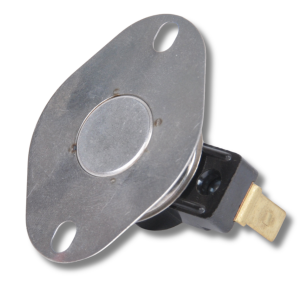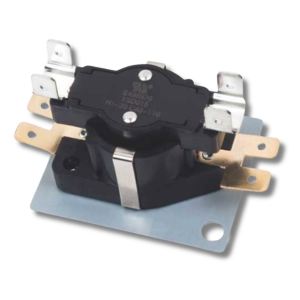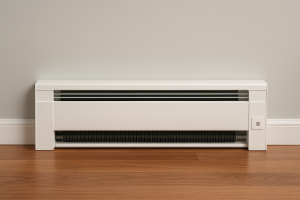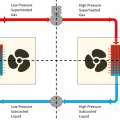Electric baseboard heaters provide efficient heating in residential and commercial spaces. However, because they operate at high temperatures and draw significant electrical current, they require safeguards for both safety and performance. Senasys designs thermostats used to control and limit baseboard heaters, including snap disc limit switches and heat sequencers, to deliver reliable thermal and electrical management.
For technical assistance or OEM pricing, contact Senasys today.
 Snap Disc Thermostats for Baseboard Heater Overheat Protection
Snap Disc Thermostats for Baseboard Heater Overheat Protection
Electric baseboard heaters rely on passive convection. Inside the unit, heated fins warm surrounding air without fans. This design keeps operation quiet and efficient. At the same time, it increases the risk of overheating if airflow becomes blocked or restricted.
A snap disc limit switch addresses this risk by cutting power when internal heater temperatures exceed safe thresholds. Once temperatures return to normal, the switch resets automatically. This cycle prevents equipment damage and reduces fire hazards while eliminating the need for manual resets.
Example: Senasys 2511L003-863 Snap Disc Thermostat
-
Opens at 220°F and resets at 205°F
-
Rated for 25 Amps at 240 VAC (100,000+ cycles)
-
DC rating: 30 Amps at 12 VDC
-
Large mounting bracket for secure installation
-
Custom terminal and bracket configurations available
Senasys also offers snap disc thermostats with a variety of temperature set points, reset types, mounting options, and electrical ratings. As a result, OEMs and HVAC installers can choose the exact specifications needed for their application while ensuring safety and compliance.
→Find out more about snap disc thermostats for baseboard heaters
 Heat Sequencer Switches for Baseboard Heater Load Control
Heat Sequencer Switches for Baseboard Heater Load Control
In addition to thermal protection, some electric baseboard heaters require controls that manage electrical load. A heat sequencer serves this role by controlling the timing of heating element activation. Instead of allowing all elements to power on simultaneously, the sequencer staggers activation. This prevents a dangerous electrical surge, protects circuits from overload, and reduces fire hazards.
How a Heat Sequencer Works
When the thermostat signals a demand for heat, the sequencer begins warming a small internal element. As this heating element raises the temperature, it bends a bimetallic disc, which closes electrical contacts in sequence. Each contact activates one heating element at a time until all are on.
Once the room reaches the thermostat setting, the sequencer cools down. The bimetallic disc bends in the opposite direction, opening the electrical contacts in reverse order. This process shuts off the heating elements gradually, maintaining safe operation.
Heat Sequencer Product Specifications
-
Rated for 25 Amps @ 277 VAC
-
Timing sequence range: 10–100 seconds
-
Operating temperature range: –40°F to 150°F
-
SPST, SPDT, and DPST switch configuration options available
-
UL and cUL approved
→Learn more about heat sequencers for baseboard heaters
 Choosing Thermostats Used to Control and Limit Baseboard Heaters
Choosing Thermostats Used to Control and Limit Baseboard Heaters
Both thermal limit protection and electrical load management play critical roles in safe heating system operation. Thermostats used to control and limit baseboard heaters, such as snap disc limit switches and heat sequencers, help manufacturers, installers, and system designers ensure safety, compliance, and long-term performance.



